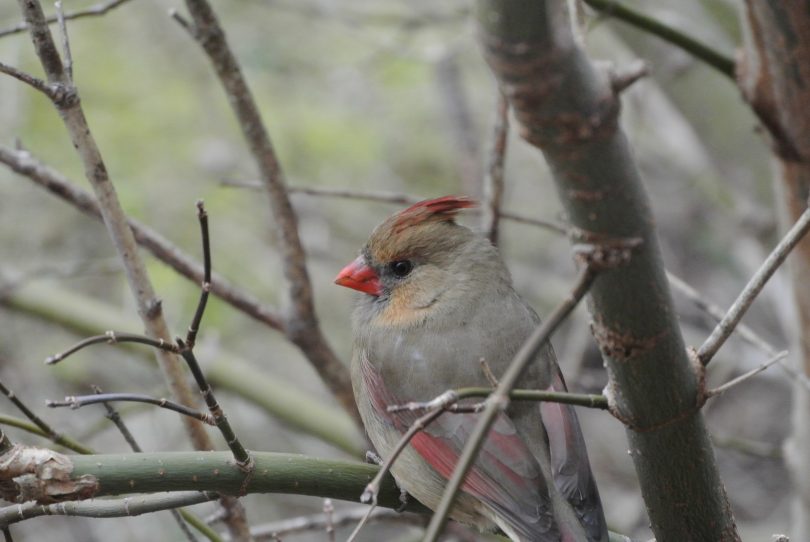I notice birds more in winter than at any other time of the year. Maybe it’s because the bushes that hide them in spring and summer have lost their leaves, or that they show up better against the snow (although here in Eastern Pennsylvania, that hasn’t been much of an issue so far…). Or maybe it’s because I’m more attuned to the color and life they bring when the rest of nature has gone to sleep.
My folks instilled a love of birds in me that continues to this day. I still have the field guides my mother used to identify the many different species that would come to the feeders outside their kitchen window. I’m not an ornithologist or even an avid birder. But this year, I put a small feeder outside the window of my office here at the Moravian Church Center to invite the neighborhood cardinals and finches to stop by. Along with the pesky squirrels, it has begun to attract more and more winged friends.
Shortly after mounting my new feeder, I received a poem from Bill Gramley, a retired pastor and writer living in North Carolina. Bill and I have corresponded over the years, and he occasionally sends me his writings, which I always enjoy reading.
He sent his latest poem, “Little Bird, Who Made Thee?” as a possible submission for the magazine. Now, I typically don’t run poems on their own in the magazine (perhaps I should rethink that rule?), but this time, it was different. Each issue, I seek inspiration to write my Ponderings. The poem’s coincidental arrival, a subsequent e-mail explaining its meaning and the growing number of birds visiting the feeder all collided to say, “Here’s your inspiration.”
The poem reads:
I saw a finch on a branch near our house
swivel its neck like a child watching for traffic to pass,
then free of that, flit to the feeder,
pluck a seed, twirl the husk,
and let the breeze have its turn in the dance.
Unless you wonder like William Blake of old, and chance to ask,
“Little bird, who made thee?” you might miss what I’ve just seen:
wings and things woven just right
and little feet with tiny talons
and a beak that picks and processes food
and knows how and when and where to fly and nest
and bear a couple more who also know
by inborn mystery what to do when their time comes.
You cannot say, “There is nothing to it.”
Such intimate care as I have seen this afternoon
makes me bow my head, close my eyes,
and try to imagine
who could make such a creature.
Funny, isn’t it, how you see who you are
in a little glance like that.
—William Gramley
On its own, this is a beautiful poem that paints an imaginative picture. I’m not a student of poetry—I’ve always been more a prose kind of person—but as I sat back and read it again, I had a new appreciation how these words elicit the magic and majesty that birds represent.
A few days later, Bill forwarded a deeper, more spiritual explanation of the poem. “…well, then,” he wrote, “what does this poem say?” and proceeded to share his thoughts:
“This finch, like all creatures, is sacred, wondrous—and that is why I said ‘Thee’ rather that ‘it.’
“When we look at a little bird like this and see its magnificence and consider all it knows to do, we realize we are like that, too, in the way we have been created. Who is this God omniscient and close?
“God watches over this bird, as Jesus once said, and knows when it falls, which is almost beyond understanding, and implies that we are more valuable in comparison and must remember how God watches over us and provides what we need. Therefore we should not be anxious. Watching this finch reminds us of that.
“This bird does what he or she has been created to do, no questions asked. Am I doing what I was created to do? Do I know what I was created to do?
“Funny, isn’t it, how a glance like this tells us who we are. Do we actually take time to look? What do we spend most of our time looking at? Is there something or someone we don’t want to see?”
I’m glad this poem arrived when it did. Yes, it helped me write my column. But more importantly, this poem offers another chance to recognize God in the world. Bill’s words help me see God’s hands at work in the cardinal pair visiting my feeder and the purple finches waiting their turn.
I hope you enjoy this issue of the Moravian. In it, we share information on the 100th anniversary of the Larger Life Foundation, the ongoing mission work of our church, a workshop on facilities stewardship and more. As always, I welcome your questions and comments.
Peace,







